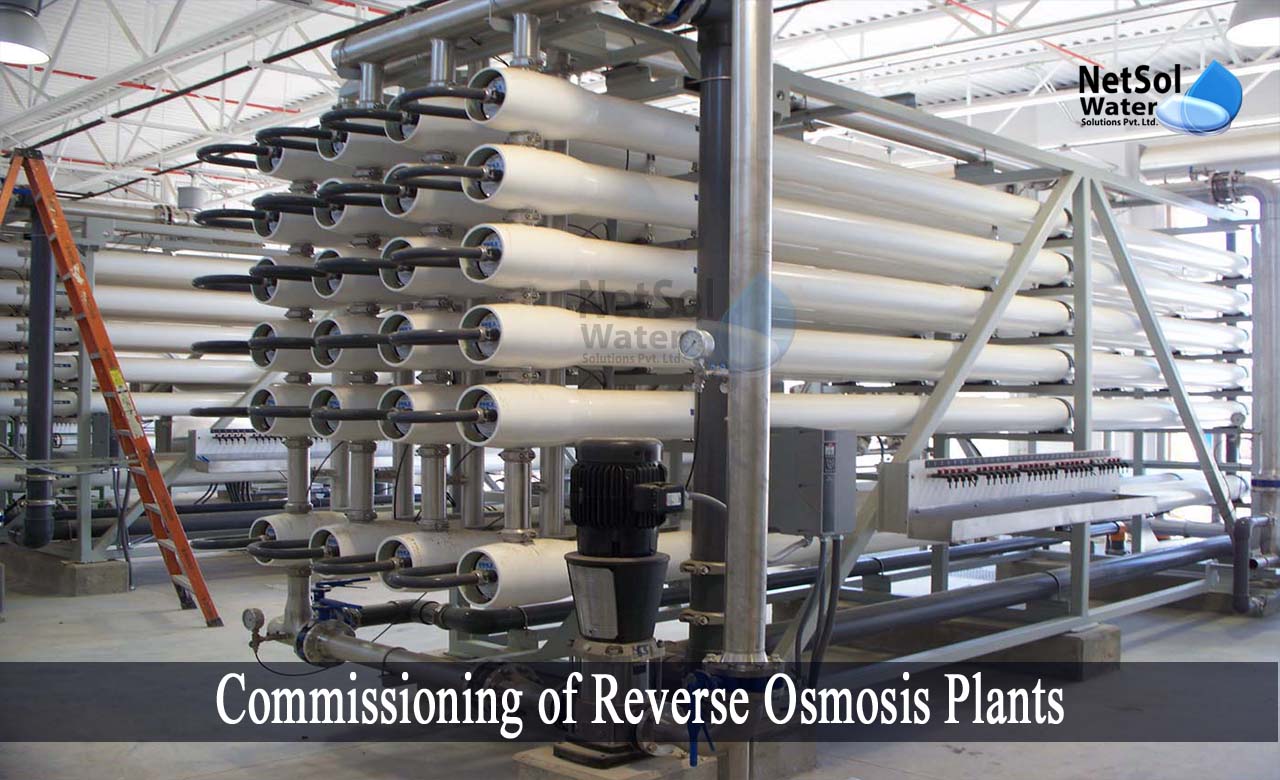Reverse Osmosis
In reverse osmosis (RO), which is a water treatment method, a semi-permeable membrane is employed. This membrane technology is not a filtering system in the traditional sense. An applied pressure is used in reverse osmosis to offset osmotic pressure, which is a characteristic determined by chemical potential. Reverse osmosis, which is used in both industrial operations and the production of drinking water, removes many different types of molecules and ions from solutions.
But after installing Commercial RO Plants, we need to commission them. In this blog, we will talk about the commissioning of reverse osmosis plants.
Contaminants removed by Commercial RO Systems
Reverse osmosis is widely known for its usage in purifying drinking water from saltwater, and in areas with high levels of chemicals, such as metal ions, lead, arsenic, fluoride, radium, sulphate, magnesium, potassium, nitrate, fluoride, and phosphorus. Although organizations such as the BIS, ISO, the Ministry of Drinking Water and Sanitation (Govt. of India), and others have set criteria for the quality of drinking water, no equivalent criteria, for the selection of an appropriate/adequate water purification system have been established.
As a result, water purification techniques, such as Reverse Osmosis have to be employed, for commercial and industrial purposes.
What is Commissioning of Reverse Osmosis Plants?
Commissioning is a series of operations used to establish the integrity of the system's components, and verify its equipment, including all mechanical, electrical, and instrumentation devices, as well as to assure the process's sustainability, for the overall system's proper operation.It is generally the last phase of any project before transfer to the owner, and happens immediately after all civil and mechanical construction is completed.
Stages of Commissioning
There are nine important parts to commissioning, which is typically done in three stages: pre-commissioning, commissioning, and trail operation.
All of these basic features are the same and may be found in a variety of sectors, such as petrochemical plants, refineries, power plants, gas, reverse osmosis, and water treatment facilities, with certain limits and changes.
Commercial Reverse Osmosis Plant Commissioning Elements
- Planning is essential because we will be unable to commission a plant safely and on schedule, if we do not plan appropriately.
- Mechanical completion (MC) is the stage at which the commissioning team takes over the system, from the quality control of the construction team.
- The process of commissioning engineers confirms that every pipe, device, and instrument in the field, is in conformity with the authorized PID, known as piping and instrumentation checking (PID checking).
- Before starting the commissioning process, all pipes must be cleaned using different methods, such as air ploughing and flushing, mechanical vessel and tank cleaning, as well as ensuring that motors and other equipment are not overburdened.
- Commissioning entails introducing utilities, dry tests, wet runs, and hot runs, depending on the industry, as well as safe flow dynamic testing, solving dynamic testing, and process flow testing. Many difficulties are likely to develop during this stage, and they must be overcome before proceeding to the next.
- In reverse osmosis facilities, start-up requires putting the complete plant online, including all water supply connectors, pressure regulators, sedimentation, pre-filtration membranes, auto shut-off valves, reverse osmosis valves, and check valves.
- The process will be optimized, and pump and other equipment changes will be done during the initial operation, which involves the preparation of performance tests, for the complete reverse osmosis plant.
- RO facilities are subjected to performance testing, to ensure that they satisfy regulatory criteria under typical operating circumstances.
- Following commissioning, the engineers will resolve any grade C punch list items that do not immediately impede the operation, or process. Due to a lack of funding, which is frequent towards the conclusion of many projects, this may take long time.
Choosing globally reputed Commercial RO Plant Manufacturers
Netsol Water is a forerunner in water treatment plant manufacturing, providing optimum water management solutions, and utilizing cutting-edge technology. Our Industrial and Commercial RO Plants are highly successful, in removing all types of chemical, physical, and biological pollutants from water, and are thus widely used in a variety of sectors.
Our RO plants are distinguished for their extended service life, economic viability, and full compliance with regulatory agencies' criteria. Our service team stands by the customers, throughout the whole commissioning of Commercial RO facilities anywhere in India, and to provide post-commissioning technical help as needed.
Netsol Water is Greater Noida-based leading water & wastewater treatment plant manufacturer. We are industry's most demanding company based on client review and work quality. We are known as best commercial RO plant manufacturers, industrial RO plant manufacturer, sewage treatment plant manufacturer, Water Softener Plant Manufacturers and effluent treatment plant manufacturers. Apart from this 24x7 customer support is our USP. Call on +91-9650608473, or write us at enquiry@netsolwater.com for any support, inquiry or product-purchase related query.



